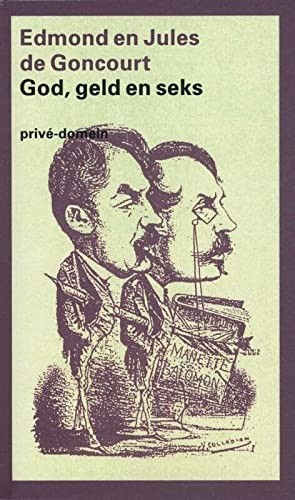RexLegendi reviewed God, geld en seks
Review of 'God, geld en seks' on 'Goodreads'
2 stars
The dairy written by brothers Edmond (1822-1896) and Jules (1830-1870) de Goncourt – now best known as the namesakes of France’s most prestigious literary prize, as well as a street and metro station in Paris – has become a cherished chronicle of 19th-century artistic and literary Paris.
Although they lived through turbulent times – the diary was written during the Second French Empire and the Third Republic – the brothers offer little reflection on political or social conflicts. Instead, they primarily produce gossip, focusing on their own circles, which include figures who now lend their names to half of today’s Parisian street directory. Among them are celebrated French authors such as Alexandre Dumas, Émile Zola, George Sand, Gustave Flaubert, and Victor Hugo, as well as foreign figures like Ivan Turgenev and Oscar Wilde.
Given my general scepticism toward navel-gazing literary circles, I probably should not have picked up this book …
The dairy written by brothers Edmond (1822-1896) and Jules (1830-1870) de Goncourt – now best known as the namesakes of France’s most prestigious literary prize, as well as a street and metro station in Paris – has become a cherished chronicle of 19th-century artistic and literary Paris.
Although they lived through turbulent times – the diary was written during the Second French Empire and the Third Republic – the brothers offer little reflection on political or social conflicts. Instead, they primarily produce gossip, focusing on their own circles, which include figures who now lend their names to half of today’s Parisian street directory. Among them are celebrated French authors such as Alexandre Dumas, Émile Zola, George Sand, Gustave Flaubert, and Victor Hugo, as well as foreign figures like Ivan Turgenev and Oscar Wilde.
Given my general scepticism toward navel-gazing literary circles, I probably should not have picked up this book in the first place. If not for the explanatory annotations (I read a Dutch translation by Edu Borger), the relentless namedropping would certainly have grated on my nerves. For an unspecialised audience, the comments are often anecdotal and insignificant, with little wit. Compared to the wonderful columns of Louis-Sébastien Mercier ([b:Tableau van Parijs 1781-1788|53920499|Niemand ontbijt meer met een glas wijn Tableau van Parijs 1781-1788|Louis-Sébastien Mercier|https://i.gr-assets.com/images/S/compressed.photo.goodreads.com/books/1596390167l/53920499.SY75.jpg|46813553]), they hardly offer any insight.
Het is in Frankrijk toegestaan met geschiedschrijving te choqueren: je mag schrijven dat Dubois een heilig man is. Maar op het gebied van de kunst en de literatuur zijn geijkte meningen heilig. Je kunt in de negentiende eeuw beter op een kruisbeeld gaan staan dan op een bladzijde van Voltaire.
Het is iets bizars dat er met de vooruitgang, de revolutie, de rechten van het volk, de heerschappij van de massa en het algemeen stemrecht nooit grotere voorbeelden zijn geweest van dwingelandij en van de almachtige invloed van een enkeling dan nu. Voorbeelden: onze keizer en Bismarck.
Een raar volk, dat Franse volk! Het wil geen God meer, het wil geen religie meer, en als het net Christus ontlieveheerd heeft, lieveheert het onmiddellijk Hugo en verkondigt het de hugoderij.
Hugo zei dezer dagen tegen Burty: ‘Praten, dat kost me moeite. Een redevoering, dat mat me even erg af als drie zaadlozingen!’ En na enig nadenken voegt hij eraan toe: ‘Vier zelfs!’
Toergenjev is een zwijn wiens zwijnerij naar sentimentalisme zweemt.
Zola is een grof en onbeschaafd zwijn, die zijn zwijnerij thans geheel in het schrijven uitleeft.
Daudet is een ziekelijk zwijn, met de grillen van een brein waarin wel eens een keer de waanzin zou kunnen binnendringen.
Flaubert is een onecht zwijn, iemand die zegt dat hij een zwijn is en het graag wil zijn om de echte, oprechte zwijnen die zijn vrienden zijn te evenaren.
En ik, ik ben een discontinu zwijn, met aanvallen van smeerlapperij die even heftig zijn als door een zaaddiertje gebeten vlees.

